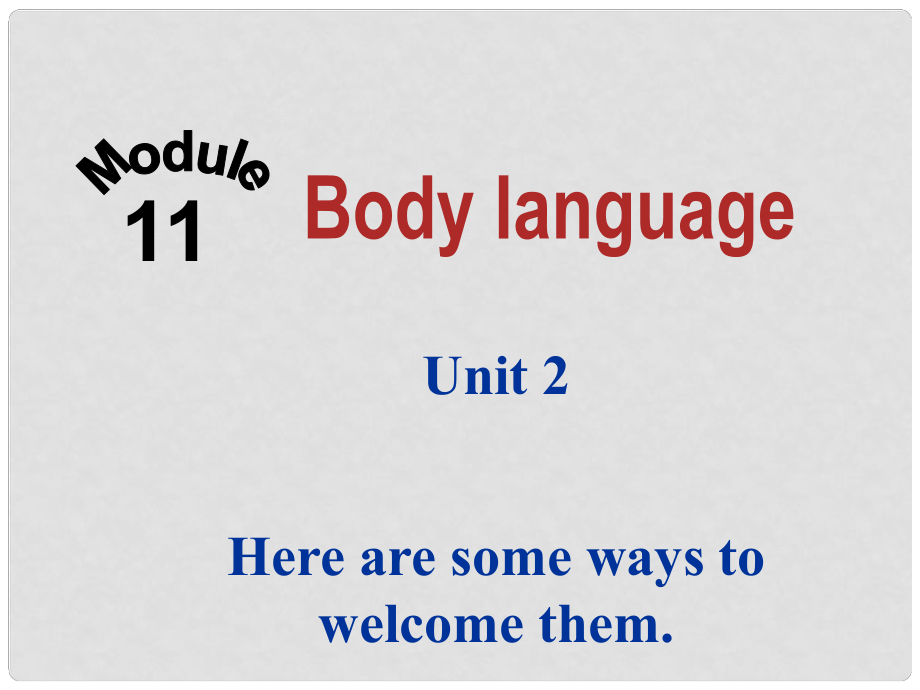《四川省華鎣市明月鎮(zhèn)七年級英語下冊 Module 11 body language Unit 2 Here are some ways to welcome them課件 (新版)外研版》由會員分享��,可在線閱讀�����,更多相關《四川省華鎣市明月鎮(zhèn)七年級英語下冊 Module 11 body language Unit 2 Here are some ways to welcome them課件 (新版)外研版(32頁珍藏版)》請在裝配圖網(wǎng)上搜索。
1、11Unit 2 Here are some ways to welcome them.smilecrysurpriseangryhappyfearWhat are the following facial expressions?Hello!successThe lastThe bestNO!Say hello!Hello!/Goodbye!/Hi!1. To understand the passage concerning body language and learn more bout the differences in body language in different cou
2��、ntries.2. Key vocabulary: finger, foot, leg, mouth, body, foreign, arm, arm in arm, hold, move, not at all, polite.3. Key structures: Give them more personal space.Be careful! Language aims/fI/fut/ni:/le/mau/bdi/frIn/手指手指 n.finger腳�;足腳�;足 n. foot膝蓋膝蓋 n. kneeWords and expressions腿腿 n. legmouth嘴���;口嘴�;口 n.
3�、bodyforeign身體�;軀干身體����;軀干 n. 外國的外國的 adj. /p:snl/:m/huld/mu:v/ brItn /個人的個人的 adj.personal手�����;手臂手��;手臂 n. arm臂挽臂地臂挽臂地arm in arm握著����;使不動握著;使不動 v. holdmove移動移動 v.Britain not at all不列顛�;英國不列顛�����;英國 一點也不一點也不/plaIt/smhw/weIv/fkt/ ru:d /禮貌的禮貌的 adj.polite某處;某個地方某處�����;某個地方 adv. somewhere揮��;招���;擺(手)揮;招�;擺(手) v.事實;細節(jié)事實���;細節(jié) n. wavefa
4��、ct事實上事實上in fact 粗魯?shù)?�;無理的粗魯?shù)模粺o理的 adj. rude1 Match the words with the parts of the body.eyefingerfootkneelegmoutheyemouthfingerkneelegfootThen Listen and readBody language around the worldBy Wang Lingling Our new foreign students are going to arrive very soon, and here are some ways to welcome them. Ho
5、w close do you stand when you talk to a friend? You can stand close to people in the Middle East but dont stand too close to North Americans! Give them more personal space. How about touching people? Chinese girls often walk arm in arm with their friends. South Americans sometimes hold your arm when
6�、 they talk to you, so you cant move away! But in Britain many people dont like other people to touch them at all.Do you look at people when you talk? In some places, it isnt polite to look at people when you talk, but in other countries it isnt polite to look somewhere else. In Britain and the US, p
7�����、eople usually look at each other when they talk. And how do you say goodbye? Thats easy, wave to say goodbye. But be careful! In Greece, its not at all polite! In fact, its very rude!1. Is body language the same in different countries?2. Is it all right to stand close to people in the Middle East?3.
8��、 Do the British like touching people?4. Do Americans look at people when they talk?5. Do people in Greece wave goodbye?Answer the question: No, it isnt.Yes, it is.No, they dont.Yes, they do.No, they dont.3. check the body language you can use in different countries and places.Stand close Touch each
9����、otherLook at people when talkingBritain Middle EastSouth AmericaLanguage points1. Chinese girls often walk arm in arm with their friends. 中國女孩常常和朋友挽手走在一起。中國女孩常常和朋友挽手走在一起。 arm in arm 表示表示 手挽手手挽手如:如: They walked along the beach arm in arm.他們手挽手在海灘上走著��。他們手挽手在海灘上走著�����。He walked from the church arm in arm wi
10��、th his wife.他和妻子手挽手從教堂走出來�。他和妻子手挽手從教堂走出來��。2. In Greece, its not at all polite! 在希臘�����,那是絕對不禮貌的�!在希臘�����,那是絕對不禮貌的!at all 用在否定句和疑問句中�,表示強調(diào)語氣�。用在否定句和疑問句中��,表示強調(diào)語氣����。at all用于否定句時���,意為用于否定句時�,意為“絲毫;根本絲毫���;根本”�,用于疑問句,用于疑問句時意為時意為“究竟��;到底究竟;到底”�,用于條件句時�����,常譯為,用于條件句時����,常譯為“當真;當真�;實在實在”�����。用于肯定句中���,表示說話人的某種情緒或情感�。用于肯定句中��,表示說話人的某種情緒或情感(如懷疑或驚奇等)�����,意為
11�����、(如懷疑或驚奇等)�����,意為“竟然竟然”等��。如:等�。如:He doesnt like you at all他根本不喜歡你。他根本不喜歡你��。Are you going to do it at all��?你究竟做不做這件事?你究竟做不做這件事����?If you do it at all , do it well.若你真要做這件事,就得做好���。若你真要做這件事,就得做好���。1、用于回答感謝���,意為用于回答感謝,意為“不用謝����;不客氣不用謝��;不客氣”。如:�。如:A: Thanks for helping me謝謝你幫助我。謝謝你幫助我����。B:Not at all. I enjoyed it別客氣��,很高興能幫你��。別客氣�,很
12、高興能幫你。A:Thank you very much非常感謝你����。非常感謝你�����。B:Not at all. It was the least I could do 不用謝�,這是我應該做的����。不用謝�����,這是我應該做的。2����、用于回答帶有感謝性質(zhì)的客套話���。意為用于回答帶有感謝性質(zhì)的客套話。意為“沒什么��;哪沒什么;哪里哪里里哪里”�����。如:�。如:A: You are very kind你真好��。你真好。B: Not at all . 沒什么���。沒什么。A: Its very kind of you你真客氣你真客氣��。B: Not at a11哪里哪里��。哪里哪里�。3. not at all 用法小結(jié):用法小結(jié):3.用于
13、回答道歉���,意為用于回答道歉�,意為“沒關系沒關系”��。如:。如:A: Im sorry Im late對不起����,我遲到了�。對不起��,我遲到了����。B: Oh, not at all, do come in噢,沒關系��,請進來。噢���,沒關系�����,請進來�。A: Im sorry to keep you waiting對不起�����,讓你久等了對不起���,讓你久等了�。B:Oh����,not at allIve been here only a few minutes哦��,沒哦��,沒關系����,我也剛到幾分鐘���。關系�,我也剛到幾分鐘��。4. 用來表示否定用來表示否定(是是No的加強說法的加強說法)���,意為��,意為“一點也不:完全一點也不:完全不不”�����。如:����。
14�、如:A : Are you busy? 你忙嗎你忙嗎?B : Not at all一點不忙���。一點不忙���。A : Is it difficult to study English? 英語難學嗎英語難學嗎?B : Not at all一點不難�����。一點不難�����。A : Ill be away on a business trip. Would you mind looking after my cat? 我要因公出差����,請幫我照看一下我的貓���,你介我要因公出差�����,請幫我照看一下我的貓��,你介意嗎意嗎?B: Not at all. Ill be happy to一點不介意,我很樂意��。一點不介意���,我很樂意�。4 Comp
15��、lete the passage with the words from the box.Britain fact foreign hold move personal polite rude someone wavePeople from _ countries have different body language from us. In _ ,people dont like to touch other people, but in South America they like to _on to you so you cant _away. Remember to give _
16����、from North America lots of _ space. In some countries it isnt _ to look at people when you talk. And it isnt polite to_ goodbye in Greece. In _���,its quite _ !factBritain holdmovesomeonepersonalpolitewaveforeignrude5. Work in groups. Talk about your class rules.Shall we stand up when we answer a quest
17����、ion in class?Yes, we shall.6 Make a list of class rules for new students in your school. Stand up when you answer a question in class. Dont be late for class. Be polite to the teacher. Dont eat food in class.Dont take another students thingsDont push anyone when in line.Dont shout.Ask teacher when y
18、ou need to leave the class.Walk quietly around the school.Do what the teacher say the first time they ask.Respect other student.Be helpful to new students.Possible answer:1. 1. 和某人談話和某人談話_2. 2. 挽著胳膊挽著胳膊_ _ 3. 3. 一點也不一點也不_4. 4. 當心����,小心當心���,小心_5. 5. 私人空間私人空間_一����、一���、 詞匯練習詞匯練習talk to sbarm in armnot at allbe c
19����、arefulpersonal space 當堂檢測當堂檢測1. Lets go and play football, _? Thats wonderful!A. will you B. do you C. wont we D. shall we2. Dont forget to correct the mistakes you made in your hometown, _?A. dont you B. will you C. arent you D. havent you二����、二、 選擇選擇3. -I dont think Lucy will come today, _ she? -_, she wont. She is ill and stays at home. A. wont; No B. will; No C. wont; Yes D. will; Yes 4. -Dont stop on the grass next time, Mike. -_. A. Is that so? B. Dont worry C. I dont know D. Sorry, I wont
 四川省華鎣市明月鎮(zhèn)七年級英語下冊 Module 11 body language Unit 2 Here are some ways to welcome them課件 (新版)外研版
四川省華鎣市明月鎮(zhèn)七年級英語下冊 Module 11 body language Unit 2 Here are some ways to welcome them課件 (新版)外研版

